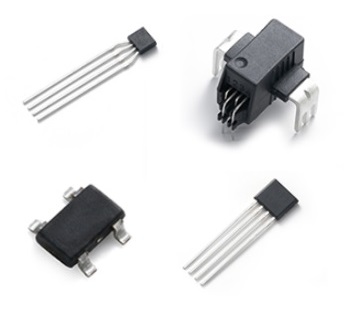Matrix produces a wide range of Hall-sensing solutions for applications including automotive, smart home, consumer electronics, robotics, and test and measurement, whether that be in the form of a Hall element, switching Hall IC, linear Hall IC, or an integrated sensor. These devices are available in a wide variety of package options with the World’s smallest Hall sensor (used in camera modules) a key highlight in the range.
The use of novel materials gives Matrix’s Hall elements greatly improved sensitivity over traditional silicon-based alternatives:
The gallium arsenide (GaAs) devices offer 1-order-of-magnitude sensitivity improvements over silicon with extremely low drift with temperature (approx. 0.3%/°C max. for input resistance), high signal-to-noise ratio, and a linear dynamic range up to 2 T with zero hysteresis. An example datasheet for a product in this family of devices can be found here.
The indium antimonide (InSb) devices further improve sensitivity to 2 orders of magnitude over silicon at the expense of sensitivity to changes in temperature (approx. -1.8%/°C for input resistance). These solutions are best suited for closed-loop current sensing and motor rotor position control.
Both types of devices feature operating temperatures as wide as -40°C to +125°C with various Hall voltage options (10s to 100s of mV), resistance characteristics (100s to 1000s of Ω), and maximum input currents up to 25 A for GaAs and 20 A for InSb.
Evaluation boards are available on request for this technology, and Matrix states minimum order quantities from 500 pieces to 10,000 pieces depending on the device selected (Hall elements). Due to a written language barrier, ipXchange recommends filling out the application form below if you wish to learn more about the specific high-sensitivity solutions offered by this innovative company. We will do our best to connect you to assist in bringing your project to market.


